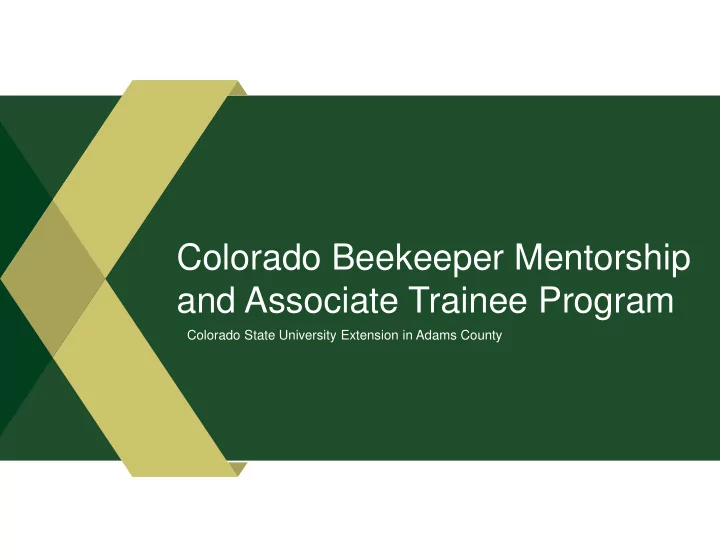

Colorado Beekeeper Mentorship and Associate Trainee Program Colorado State University Extension in Adams County
Colorado Beekeeping Mentorship Volunteer Program Overview • Designed to train volunteers who can mentor beekeepers – Discounted program fee – Volunteer requirement • Possibly train mentors for Bee Associations – Requires beekeeping experience – Application and Interview required – Will have extra homework and a requirement to report on a topic of choice from the reading material to the class – Required to read and report on a scientific / research based article – Attendance is required (only 1 excused absence is allowed).
Colorado Beekeeping Associate Trainee Program Overview • Designed for students who do not want to volunteer – Program fee is higher – No volunteer requirement – No association with Colorado State University Extension or Bee Associations
Colorado Beekeeper Mentorship and Associate Trainee Program Week One: Program overview, Understanding bees and bee management, Bee activity Program overview, Understanding bees and bee management, Bee activity inside and outside the hive.
Understanding Bees • Genetics • Queens, Drones, and Workers • Development stages and Timelines
Colony Activities • Inside Activities – Brood Rearing – Comb Building – Nest Homeostasis – Food Exchange, Handling and Hive Odor – – Defense Defense • Outside Activities – Flight (various kinds) – Foraging and Communication – Other Behaviors (washboard movement, bearding)
Colorado Beekeeper Mentorship and Associate Trainee Program Week Two : Beekeeping equipment, Obtaining and preparing for bees.
Equipment • Basic Hive Parts • Protective Equipment • Hardware – – Smoker Smoker – Hive Tools – Frame Grip – Bee Brush • Langstroth vs Top Bar
Obtaining and Preparing For Bees • Packages – Source of bees! • Nucs • Established Hives • Wild Colonies • Swarm Collection • Selecting a Site (good neighbor policy) • Local Policies and Code Enforcement • Hive Orientation • Recordkeeping
Colorado Beekeeper Mentorship and Associate Trainee Program Week Three : Working beehives, Packages and nucs, Feeding bees.
Working Beehives • When to check a hive and when not • Preparation for checking a hive and the “hive diary” • Protective equipment – Dress – – Smoker Smoker • Examining a colony – Frames (what to look for) – Finding the Queen – Colony Temperament • Bee stings and first aid
Packages & Nucs • Ordering and picking up bees • Installing packages • Releasing the Queen, dealing with Queen issues • Reasons for package failures
Feeding Bees • Reasons for feeding bees • Nutritional requirements; seasonal differences • Syrup recipes / Sugar considerations • Types of syrup feeders • Non-syrup food (dry sugar, mock candy, fondant, honey, pollen) • Collecting and storying pollen, feeding pollen and pollen substitutes
Colorado Beekeeper Mentorship and Associate Trainee Program Week Four : Plants, Pollination, and Habitat
Plants, Pollination, and Habitat • Mountain Perennials • Pollination – Basic Botany – Mechanics of pollination – Economic value of pollination • Common plants important for pollinator habitat
Student Research Presentations
Colorado Beekeeper Mentorship and Associate Trainee Program Week Five : Pathogens and Parasites, Adult diseases, Brood diseases, Pesticide problem, Pathogens and Parasites, Adult diseases, Brood diseases, Pesticide problem, Pests of honey bees.
Pathogens & Parasites of Honey Bees • Adult Diseases – Colony Collapse Disorder – Nosema (N. apis & N. ceranae) – Amoeba Disease – Septicemia – Spiroplasma – Dysentary • The Pesticide Problem
Pathogens & Parasites of Honey Bees • Brood Diseases – American Foul Brood – European Foul Brood – Chalkbrood – Viral Diseases – Deformed Wing Virus – Black Queen Cell Virus – Israel Acute Virus – Sacbrood Virus – Acute Bee Paralysis Virus
Pests of Honey Bees • Tracheal Mites • Varroa Mites (Varroosis) • Wax Moth • Small Hive Beetle • Africanized Honey Bees – USDA Bee Lab in Tucson, AZ Africanization testing • Minor Insect Problems
Pests of Honey Bees • Animal Pests – Skunks – Raccoons – Bears – – Mice Mice – Human Vandals • Integrative Hive Management
Colorado Beekeeper Mentorship and Associate Trainee Program Week Six : Seasonal management, Harvesting, Winter stores, Queens.
Winter / Spring Management • Wintering – General Rules – The winter cluster – High Altitude – Windbreaks – Insulating / Wrapping • Late Wintering Activities
Winter / Spring Management • Spring Maintenance – Evaluating Hives – Spring Dwindling – Supering • Other Winter / Spring Activities
Summer / Fall Management • Summer – Cooling Hives – Honey Flow – Apiary Tasks in Summer – Harvesting Honey • Removing bees from honey supers – Bee Escapes – Fume Boards • Extracting Honey • Harvesting Comb Honey
Summer / Fall Management • Fall – Removing Supers • How much honey to leave for hive; how much to harvest – Disease / Mite evaluations • Treatments (if warranted)
Queens • Obtaining Queens – Types of Queen cages – Care of Queen cages – Marking or clipping your Queen – Spring requeening – Summer / Fall requeening – Queen introduction – Two-Queen system • Queen rearing – good info, but beyond the scope of this class.
Colorado Beekeeper Mentorship and Associate Trainee Program Week Seven: Cottage Food Certification Class Cottage Food Certification Class
Cottage Food Certification – Specific for Beekeepers
Cottage Food Certificate Students will obtain a three year Cottage Food certification, which will allow them to sell honey and some products made with honey. Students will receive the entire cottage food safety course, plus an emphasis on honey.
Colorado Beekeeper Mentorship Program Week Eight : Mentor volunteer and development training is for the Mentors only Mentor volunteer and development training is for the Mentors only
Volunteer Information • Associate Students do not have to attend this class, but may do so! • Mentorship and teaching skills development development • Common questions from a beginning beekeeper • Volunteer activities / next steps • Course evaluation
Thank you Adams County Extension
Recommend
More recommend